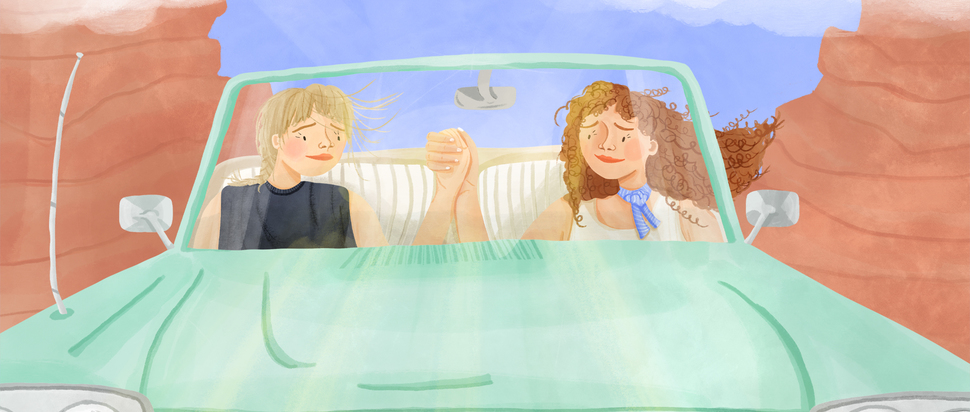The Feminist Legacy of Thelma & Louise
Three decades on, Thelma & Louise is still a poignant example of the rape-revenge genre colliding with reality. We consider how its tragic finale and portrayal of misogyny are echoed in a more recent example of female vigilantism fantasy
Some cinematic stories are worth looking back on in reverse, beginning at their ending. This is the case with 1991’s Thelma & Louise, a feminist take on the great American road movie, whose aura has stayed untouched partly due to its iconic, freeze-framed final shot.
It’s hardly a spoiler to dwell on that image immortalising the protagonists in mid-air as they plunge into the Grand Canyon in their 1966 blue Ford Thunderbird. Callie Khouri’s Academy Award-winning screenplay flipped the script on the buddy movie, a genre saturated with male hustlers wreaking havoc on the road and, almost inevitably, getting away with it. In this finale, however – one of the most recognisable in film history – Thelma (Geena Davis) and Louise (Susan Sarandon) aren’t afforded the luxury of being forgiven with a shrug and a smile.
Khouri’s script, directed by Ridley Scott, offers a searing look at the institutions failing women. The film begins with the two best friends planning a simple road trip to a fishing cabin to escape the humdrum of their lives in sleepy Arkansas, but get more than they bargained for when a man attempts to rape Thelma. Louise, a sexual assault survivor, pulls the trigger and kills him. It’s a split-second decision that forces them to hit the road and never turn back.
Used to being sidelined and silenced, the two women don’t go to the police. It's not that they fear not being believed, they know that no one is going to believe them. This is a world where a man’s word carries more weight than a woman’s truth. It’s also a world where “friendly” is code for “predatory.” “That’s a good thing they’re not all as friendly as you,” a wise waitress tells bar patron and self-proclaimed "nice guy” Harlan (Timothy Carhart) mere hours before he forces himself on Thelma.
Premiering 30 years ago, Thelma & Louise remains a poignant example of the rape-revenge genre and female vigilantism fantasy colliding with reality. By not sugarcoating the pill, Scott and Khouri’s film sets an interesting precedent for other female-fronted narratives where trauma is processed in an over-the-top denouement. Three decades later, the camp, candy-coloured world of Emerald Fennell’s Promising Young Woman isn’t all that dramatically different. Both are such devastating studies in the casual horror of inhabiting the world as a woman that their bleak endings shouldn’t come as a surprise.
Fennell’s film follows Cassie (Carey Mulligan), whose best friend, Nina, died by suicide months after being raped at a party. Years later, Nina’s rapist is living his best life: he has a good job, is well-respected and about to get married. It’s this sobering realisation that prompts Cassie to take matters into her own hands. Similar to the way Thelma and Louise face their fate unflinchingly, Promising Young Woman's final act sees Cassie infiltrate the bachelor party for Nina’s abuser posing as a stripper, aware that she might not come back if her plan for vengeance backfires.
Female rage and a complete distrust in the institutions sworn to protect society against male violence are the threads linking the two films. Thelma & Louise and Promising Young Woman brilliantly portray the shortcomings of a system not accustomed to listening, believing or protecting women. Both prompt a necessary conversation on rape culture, victim-blaming and a lack of accountability for men, even more so if they’re rich and white. Particularly, they provide valid counterarguments to the weak #NotAllMen defence used to dismiss the systemic nature of gender-based violence.
From Thelma’s controlling husband to a disgusting, catcalling truck driver they encounter on the road, no male character is irreprehensible – not even the well-meaning state police detective, played by Harvey Keitel, who proves unable to use what little leverage he has to help the two women. Secretly rooting for them, he is just as crushed as the next viewer when the two fugitives drive headlong off that canyon cliff.
Despite dealing with a difficult subject, Thelma & Louise is a liberating movie whose power and humour aren’t lessened by its tragic finale. Inspired by her friendship with country singer Pam Tillis, Khouri penned a ride-or-die sisterly tale. The final, unscripted kiss between Thelma and Louise, their hands clasped together as they exact their suicide pact, can be seen as a precursor to the winky emoji face Cassie sends in a pre-scheduled text message at the end of Promising Young Woman. “Cassie & Nina”, she signs off, when justice is finally achieved at a very high cost. The ultimate sign of an unbreakable bond lies in that ampersand, the same connecting Thelma & Louise – and all women.
Thelma & Louise’s feminist legacy is as relevant as ever in the #MeToo era. This isn’t the last great film about women seeking revenge or freedom on the road, but it’s one of the first that contributed to changing the game, in the mainstream at least. What would be different today, one would hope, would be its creative team. Thirty years ago, co-producer Scott considered at least three other male filmmakers before helming the project himself. Today, it would be imperative for a movie so centred on the female experience to be directed by a woman. In a still largely male-dominated industry, the recent rise in riveting, female-directed independent features like Promising Young Woman has been a beacon of hope and representation. This wave is pushing for change, demanding that Hollywood, too, embrace and champion the female gaze, one that is fiercely going forward, foot on the pedal.
